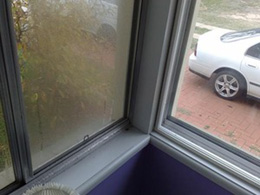Condensation/Wet Windows

Winter can be a beautiful time of year with crisp, cool nights and sunny days. Unfortunately, it is also a time that our windows tend to collect condensation. We like to keep the house closed up to retain heat, but this can mean less ventilation, a key cause of condensation.
Magnetite’s acrylic glazing creates a thermal barrier at the window which limits the contact between the warm and cold air and helps to reduce condensation on the window. The picture on this page is an installation in Canberra. The left hand side of the glass, with the condensation, doesn’t have Magnetite double glazed windows installed. The right hand side of the glass, with the clearer view, has Magnetite installed. As the existing window is aluminium framed it is important that our Magnetite panels insulate the entire window (frame and glass) to get the best results.
Condensation occurs when warm moist air comes in contact with cooler air or surfaces. As the warmer air cools, it can’t hold as much moisture. Excessive moisture in a room can be the result of various sources: steam from cooking, showers, clothes dryers, un-flued gas heaters, washing machines, indoor plants, even evaporation from your body and breathing. Once water vapour is in the air, it easily travels to other areas of the house where it can come into contact with cooler surfaces and condense.
The most common places for condensation to occur are windows. Corners of rooms are also prone because they tend to be cooler and have less air movement. When excess moisture is combined with poor ventilation, the chances for condensation are high. This excess moisture can lead to mould growth; it can also damage window sills and furnishings. Ultimately, it affects the view through your window. Condensation will form on any surface when it is below the dew point temperature of the surrounding air. Generally small quantities of condensation are tolerable provided it can dry without causing damage. If the environment remains moist for a substantial period of time degradation may occur through fungal growth, mould, timber rot and corrosion.
In order to avoid condensation the surface temperature must be increased or the moisture in the surrounding air must be reduced. It is important that a room is adequately ventilated during the day. Mould can trigger allergies and asthma which affects you and your family’s health and quality of life.



